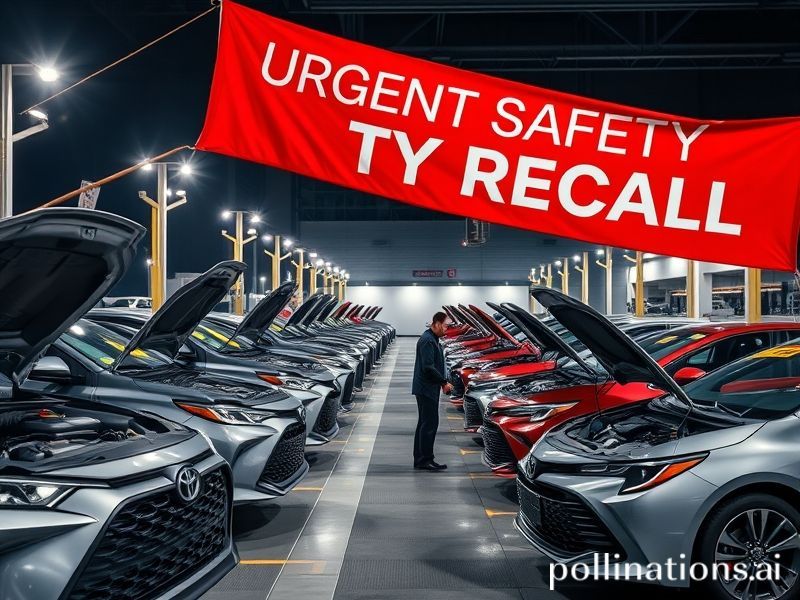8.7 Million Toyotas Recalled Worldwide After Car Decides Gelato Shop Is Safest Destination
It’s March 2025, and Toyota has just issued its largest recall since the company discovered that “just-in-time” also applies to existential dread. Some 8.7 million vehicles across six continents are being summoned back to the loving embrace of a dealership coffee machine that hasn’t been cleaned since 2019. The official reason: a software glitch in the new “Guardian Angel 3.0” suite that occasionally decides the safest place for the car is inside the nearest artisanal gelato shop.
Cue synchronized eye-rolling from Bangkok to Bogotá. In the global north, suburbanites who bought their hybrids to out-smug their neighbours now discover moral superiority has firmware. In the global south, ride-share drivers from Lagos to Lima wonder if the glitch will finally improve Lagos traffic (spoiler: it won’t). Meanwhile, Brussels bureaucrats scramble to schedule an emergency Zoom—held on Microsoft Teams, because irony is now legally mandated—while Tokyo engineers bow so deeply their necks risk subduction into the Philippine Plate.
The timing is exquisite. Europe is busy banning internal combustion with the fervour of a reformed smoker, China is busy subsidising EVs with the fervour of a state that prints the money it saves, and the United States is busy arguing on TikTok about whether steering wheels are woke. Toyota, the world’s reluctant electrician, chose this exact geopolitical moment to remind everyone that electrons are just as temperamental as hydrocarbons, only less flammable and more litigious.
Investors reacted with the composure of a cat in a cucumber patch. Shares dropped 11 % in Tokyo before lunch, recovered 6 % after someone remembered Toyota still owns more microchip inventory than some sovereign nations, then dipped another 3 % when Goldman Sachs suggested “microchip” might be an overstatement. The Nikkei’s algorithmic traders—trained on decades of polite Japanese market etiquette—somehow triggered a flash-crash that was blamed on “foreign volatility,” which is finance-speak for “we’d rather not name the American hedge fund publicly.”
Environmentalists, never ones to waste a crisis that isn’t theirs, declared the recall proof that humanity should abandon personal vehicles altogether and adopt “fifteen-minute cities,” a concept that works brilliantly if you never need minute sixteen. The Global South responded by pointing out that fifteen-minute cities are adorable when your water arrives every third Tuesday. Still, NGOs in Nairobi gamely launched a hashtag campaign—#PedalNotPetrol—conveniently ignoring that most recalled Toyotas in Kenya are already jerry-rigged to run on cooking oil and prayer.
Back in Japan, the bowing engineers issued a 37-page apology letter whose footnotes contain more sincere remorse than most nations’ constitutions. It helpfully clarifies that the glitch only manifests when the vehicle’s AI detects “excessive driver confidence,” which explains why no German autobahns have reported crashes but every influencer in Dubai is suddenly an involuntary pedestrian. The fix, we are told, involves downloading a patch labelled “Humility Update 1.2,” available at dealerships between the hours of “we open precisely at 9:00” and “we close whenever the sake runs out.”
Broader significance? The recall is a gentle reminder that globalisation works brilliantly until a single line of buggy code unites the human race in shared inconvenience. Supply chains stretch like cheap dental floss; one tug in Aichi Prefecture and a Lagos Uber driver feels the yank. Meanwhile, regulators on three continents have discovered that writing software standards is hard when the programmers learned ethics from Stack Overflow comment threads.
And so the planet’s 8.7 million most safety-conscious motorists will spend the next six weeks discovering that dealership Wi-Fi is slower than the moral reckoning it was supposed to facilitate. Some will emerge with patched cars, others with complimentary air-fresheners that smell faintly of shame. All will agree—sotto voce—that perhaps the real recall was the overconfidence we programmed along the way.
Drive safely, Earth. Or at least update your humility patch.







